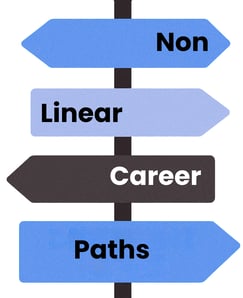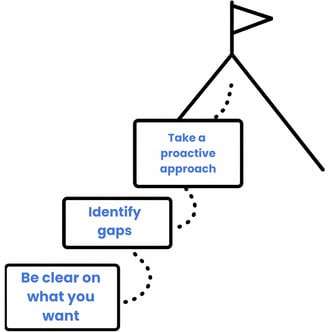What's next after Graduation?
Graduation season is here! It's an exciting time of celebration for students and their supporters but can also be marked by anxiety over future plans. Whether you know what your next steps are, or you're figuring things out, this blog provides a useful overview of how to navigate the current job market.
7/14/20256 min read


Graduation season is upon us!
If, after years of lectures, deadlines and late nights working on your assignments, you find yourself at the finish line, congratulations! The time has finally come to recognise you and your achievements.
But what comes after the celebrations? After photos of you in cap & gown and of your family with wide grins make their rounds on social media.
What does the next chapter look like for you?
Perhaps it looks like starting a graduate scheme, or maybe you’re going on to further your education?
For many graduates it’s a period of figuring things out.
Regardless of your circumstances, this is both an exciting and overwhelming time.
As you consider your prospects, here is timely advice on how best to show up and secure opportunities in an increasingly uncertain job market.
Technology continues to advance which means the types of roles available and how they are carried out is evolving constantly.
Flexible and hybrid working models were not just a legacy of the pandemic - they are now the norm.
Career paths are less linear these days. You can expect to change roles, industries and whole careers, many times over.


Adapting to the changing world of work
The world of work is changing and the way to succeed is to adapt.
For tips on navigating today’s evolving job market, sign up for our free newsletter.
The bottom line is that you're unlikely to navigate your career the way your parents did. The upside is you now have more freedom than ever to define success on your own terms.
To make the most of this new landscape, you’ll need a flexible mindset, a willingness to keep learning and the confidence to adapt as you grow.
So how do you navigate all of this without feeling overwhelmed?
It starts with three key steps:
We’ll unpack each one in the following sections.
How to navigate the terrain
Focus on defining:
Your interests:
What piques your curiosity?
What modules, topics, or activities did you enjoy most in your studies?
If you didn’t love your course, what would you rather do?


(1) Be clear on what you want
In a tight and uncertain market, it’s easy to assume your options are equally limited.
This isn’t true.
You will, of course, have to be realistic, but start by getting clear on what you want.
Taking time to clarify your interests, skills and experience helps you see beyond the headlines and uncover possibilities you might otherwise overlook.
If you are clear on what energises you and where you add value, you can target roles that are a genuine fit rather than applying everywhere out of panic.
This focus not only increases your chances of success but also makes your job search feel more purposeful and motivating.
Your skills:
What comes naturally to you?
What do people often praise you for?
Your experience:
What have you already done? Think part-time work, internships, volunteering?
What did you love and what didn’t work for you?
(2) Identify gaps
Once you’ve clarified what you want, the next step is to make an honest evaluation of where you stand today and how you might need to develop to achieve your goals.
Start by asking yourself:
How well do my skills and experience match the requirements of the roles I’m interested in?
Are there qualifications, technical skills, or types of experience that consistently come up in job descriptions?
What transferable skills do I already have and what would make me more competitive?
This process helps you identify critical gaps before an employer does so that you can make a plan to address them.
It allows you to focus your time on building skills, gaining experience or tailoring your applications so you feel confident and prepared when opportunities come up.


(3) Take a proactive approach
Once you’ve identified where you stand and the areas you want to develop, it’s time to put your plans into action. In a competitive market, the most successful jobseekers take consistent, deliberate steps to build momentum and open doors.
Being proactive increases your chances of success and helps you feel more in control.
By taking small, consistent steps each week, you’ll build momentum and confidence so that when the right opportunity comes along, you’ll be ready.


Tailor your CV and cover letters – Show how your skills, experience and potential fit each role. Make it easy for employers to see why you’re a strong match.
Research organisations – Create a list of 10–15 target employers in your areas of interest. Check their websites regularly for new vacancies and sign up for job alerts.
Apply thoughtfully – Focus on quality over quantity. A smaller number of well-crafted applications will have more impact than dozens of generic ones.
Network intentionally – Reach out to graduates or professionals working in organisations you admire. Use LinkedIn’s alumni tool to find connections and ask for short, friendly conversations to learn more about their roles and company culture.


Prepare for interviews – When your invitations to interviews start to come in, take time to prepare thoroughly. Practice with a trusted friend or mentor and research the organisation so you feel confident.
Track everything – Keep a simple spreadsheet of applications, networking conversations and interview outcomes. Regularly review what’s working well and where you might adjust your approach.
Graduates entering the workforce this year are also stepping into an environment that is much more complex:
Recent data shows that the UK job market has seen a marked slowdown in 2025. The number of job vacancies fell by 6.5% in the year to May 2025, with sectors like professional services and financial services seeing some of the sharpest drops.
The rapid adoption of Artificial Intelligence (AI) technologies is having a significant impact. Large employers could be set to cut more jobs, whilst the UK’s Big Four accountancy firms have already cut hundreds of graduate roles as AI advances continue.
In the UK, government policy like the increase in employer National Insurance contributions will increase annual costs for UK businesses. The response from employers is likely a freeze or reduction in hiring.


Shifts in the global economy, including renewed trade tensions under the United States’ Trump administration, high inflation and sustained conflicts in Europe and the Middle East have weakened consumer confidence and contributed to a projected slowdown in global growth.
Taken together, these factors explain why finding work in 2025 can feel especially tough and even disheartening at times.
But it’s not the whole story. There are still real opportunities out there for graduates who stay proactive, flexible and open to building new skills.
The landscape may have shifted, but with the right mindset and strategy, you can still carve a meaningful path forward.
Why it feels so hard right now


If you’ve felt anxious or uncertain about the job search lately, you’re not alone. The reality facing all job seekers in 2025 is that the market is unpredictable and has been for years.
You've got this!
For more tips on building a sustainable, confident career in today’s evolving job market, sign up for our newsletter.
The job market today is more unpredictable and demanding than it’s been in years. Paving your path forward takes intention, resilience and a proactive approach.
As you do this, remember everything you’ve achieved so far. Your studies, the skills you’ve developed and the determination it took to get here has prepared you for this moment.
So take the time to fully celebrate your graduation. When you’re ready, know that with the right strategy and mindset, your next opportunity is absolutely within reach.
Congratulations once again, and good luck!




